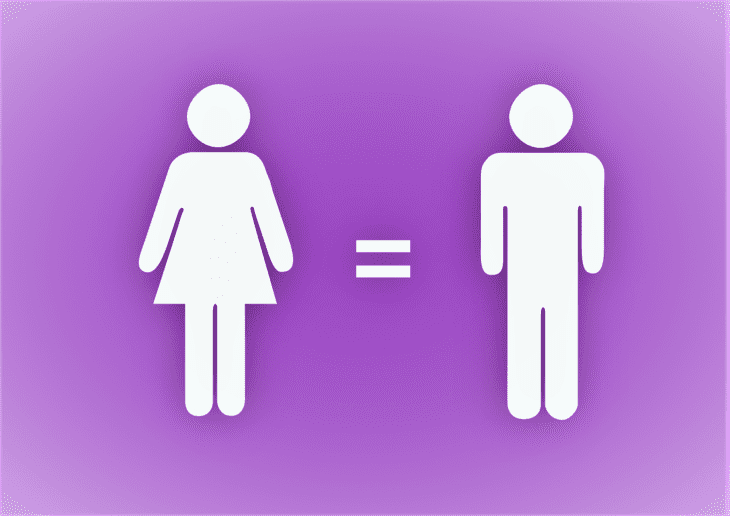As highlighted in Emma Watson’s recent speech addressed to the United Nations, society has ravaged the word “feminism.” For many, the term has become synonymous with “anti-male.” This perception derives from the attempt to view feminism as a singular movement or theory founded by lesbians and promoted by man haters. In actuality, feminism represents an entire spectrum of ideas, many of which address the impacts of patriarchy on both male and female bodies and psyches, directly and inadvertently. The concept of male/female equality, which is the focus and goal of feminism, encompasses a more fluid view of both masculinity and femininity, freeing both genders from socially binding constructs that otherwise limit freedom of individual expression. In that way, feminism as a whole, to a large extent, works to benefit, uplift and free not only women, but also men from the shackles of male dominance and patriarchy. Let’s explore how…

Source: YouTube
1. It is in no way hateful to strive to help someone carry the financial and economic burdens of a family. Patriarchal society has long made money-making the “job” of the man, even to the detriment of his own mental and physical health. For many of us, our financial predicament depends not only on how hard we work, but also upon numerous other factors like the global and even national economic climate. It is extremely burdensome to put all financial responsibilities of a household upon the shoulders of a single person — nearly impossible, even — especially during harsh economic downturns like the Great Depression and the 2008 crisis. Men are always more likely to commit suicide than women, but during the worst economic times, that gap widens with men committing suicide at 2-4 times the rate of their female counterparts. A 2014 study published in the British Journal of Psychiatry, “Economic Suicides in the Great Recession in Europe and North America,” noted that suicide rates increased for people who experienced foreclosure, unemployment or were in debt. Financial and economic burdens are onerous and even dangerous — feminists know even men need help carrying the load.
2. Less gender binaries means more fun for everyone! In a culture riddled with extreme gender binaries, women can’t play sports or even laugh too loud and men can’t cuddle babies or cute, tiny animals. That is one heck of a boring existence. As society widens the definition of “manhood” and “womanhood,” more individuals are free to participate in activities that are typically gendered and restricted to only one group or the other. That means a man can feel equally comfortable baking a cake (a traditionally “feminine” role) as he would playing football and a woman can change a flat tire while wearing high heels. The dedication of past feminists has already helped shape our current society, where “Cake Boss,” a man who loves to bake cakes, is a celebrity and Danica Patrick, the first woman to win the NASCAR Sprint Cup, participates in a long-time male-dominated sport.

Source: Odyssey
3. Feminism gives little boys the chance to be childrenfirst, and boys second. Feminists know and understand that both boys and girls have every right to be angry, frustrated, happy and even sad or empathetic: In other words, human. However, emotions that are typically classified as “feminine,” like nurturing, caring, sympathetic or sadness, are usually disallowed from boyhood expression. Statements like “boys don’t cry” and “be a man” further reinforce the idea that men and boys cannot and should not exhibit basic emotions — a very debilitating and even immature concept. Boys and men are human, not robotic, emotionless androids. Feminism seeks to help society get over that fact.
4. Feminism has given men the freedom to be fathers. In the past, many children longed for a male figure in the house, but men were frequently absent because of their role as the breadwinner. With women confined to the domestic space — along with the children — and men locked outside in the working world, it was very difficult for strong bonds to be built between child and father.
Now, many working women are capable of supporting a household or are at least able to contribute financially, allowing men to spend more time with their children and less time working. Crucial bonds that have long been absent from Western culture are being forged between father and child in a modern, post-feminist society.

Source: Pixabay
5. Feminism helps to make straight sex better and healthier. The impact of societal policing of female sexuality affects everyone, including the men who women are sleeping with. Many women must deal with debilitating feelings of guilt, shame and anxiety induced by patriarchy’s constant need to dominate and diminish female minds and bodies, which ultimately has negative effects on their sexual self-esteem. Feminism has fought to create safe spaces where women can engage in discourse about sex and their personal experiences. This not only helps women to better understand their minds and bodies, but it also enables the exploration of sexual desire and gives them the confidence to speak openly to their partners. Better communication and understanding is helpful in all relationships, especially sexual ones.
7. Feminism helps society care about things that affect the women men care about. Birth control, women’s reproductive health, the right to vote, access to education and employment are just some of the issues feminism has tackled. Feminists have also worked to protect women and girls from domestic violence, sexual harassment and sexual assault. Without the movement, the women who men love — daughters, mothers, sisters, friends, girlfriends, wives — would be voiceless and without legal or social protection.

Source: Pixabay
8. Improvement for women and girls equals improvement for everyone. Multiple studies on the socioeconomic impact of education on society have found that increases in female education attainment leads to higher levels of both economic and social development. Countries that focus on educating women and girls tend experience decreased infertility and infant mortality rates and increased GDPs. As best said by the World Bank’s lead education economist, Harry Patrinos, “the profitability of education, according to estimates of private rate of return, is indisputable, universal and global.” A study done by Cynthia Lloyd and Margaret Greene, (Girls Count: A Global Investment and Action Agenda) with just one extra year of education to women and girls, their wages increased from 10-20 percent. These improvements benefit not only females, but also their families and society as a whole since money is typically reinvested (in the form of purchases) into the community.
Original by Tiffanie Drayton
